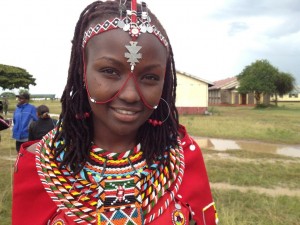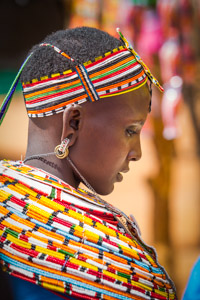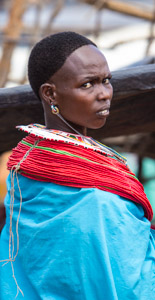It is easy to take liberty for granted, when you have never had it taken from you.
We hear about the times when women were denied the right to vote in the United States. When blacks and whites had separate drinking fountains and bathrooms. Times so rough that civil war broke out on our soil and accounted for more U.S. casualties than all wars fought since. But in those times we also learn about INDIVIDUAL people that had the heart, courage, and heroic spirit to stand up and say, THIS IS NOT RIGHT!
Rosa Parks, Dr. Martin Luther King Jr., Nelson Mandela, Anne Frank, Abraham Lincoln, and the millions of additional unsung heroes take the ranks of those who fought for a greater and equal humanity. Some where mocked, beaten, imprisoned, or even assonated. But, they go down in history as those who changed history.
Josephine Kulea is joining those ranks.
 She is a Samburu. Grown up in a culture that promotes early childhood marriage, female genital mutilation (FGM), and beading. Young girls are looked at by parents as a means to make money via cows and goats. As early as 6 years old their daughter may be sold to a suitor of their choosing for marriage. Often times, the future husband is between 40-55 years old! These young girls have no voice and they are scared. A young girls’ childhood is taken from them and their future is dark, grim, and most of us couldn’t even imagine a member of our family being forced into similar circumstances, let alone forcing our own children to go through it.
She is a Samburu. Grown up in a culture that promotes early childhood marriage, female genital mutilation (FGM), and beading. Young girls are looked at by parents as a means to make money via cows and goats. As early as 6 years old their daughter may be sold to a suitor of their choosing for marriage. Often times, the future husband is between 40-55 years old! These young girls have no voice and they are scared. A young girls’ childhood is taken from them and their future is dark, grim, and most of us couldn’t even imagine a member of our family being forced into similar circumstances, let alone forcing our own children to go through it.
Then comes Josephine. A Samburu girl who was raised by her mother to stand up for what is right. She would sit and watch her mother rescue girls from early marriage and FGM, house them in their tiny one room hut, sometimes struggling to feed an additional 6 children. Josephine grew up watching her mothers and learning to always fight for what is right.
Now, she is doing just that. She is attempting to change a culture with centuries of both amazing and horrifying traditions. Deemed illegal from the Kenya government, but never directly enforced, she has a long uphill battle of not just saving lives, but changing the mindset of an entire culture.
Josephine decided that she could not sit on the sidelines while young girls where being raped, abused, mutilated and if they got pregnant, forced to kill their own children. So she opened up her home to rescue girls from this horrifying act. Soon, her home was full with over 20 young children and received daily calls from others wanting to seek rescue. Realizing she needed more help, she reached out to her friends, church, and other community members that would be willing to be a face for change.
Now, she has started the Samburu Girls foundation. Though only 2 years old, she has rescued and cares for over 80 children, has a team of volunteers, no paid employees, and gets funds from other villagers willing to silently support her mission. But, the road ahead is going to be a long one.
As we sit down in a tiny room outside of the church, the sun is setting and the orange glow starts to illuminate the room. A phone call interrupts her story and she looks at the number confused, asking permission to be excused, our team waited inside letting the content of our previous conversation sink in.
A couple minutes later the door opens and she stated, “I’m sorry, but I have to go. A young girl has been walking for nearly 40 km, she is supposed to be married tomorrow. I need to go rescue her.”
She leaves.
This is the life of Josephine Kulea. We leave the room mentally preparing ourselves for the days ahead.
About FGM:
Several African tribes consider female genital mutilation a right of passage for a young girl to become a women. Typically a girl is between the ages of 6 – 12 years old. It is recognized internationally as a violation against the human rights of women and young girls. Female genital mutilation (FGM) comprises all procedures that involve partial or total removal of the external female genitalia, or other injury to the female genital organs for non-medical reasons. (http://www.who.int/mediacentre/factsheets/fs241/en/)
The day before a young girl gets married, she is pulled away and brought to a sacred area where all young girls cut. They use the same knife, same table, and nothing is considered ‘sanitary’. Nearly 30% of the girls are infected with a blood born decease, and many die from hemorrhaging. Once she is cut, she is given merely hours to heal and is brought to the alter to be married.
About Beading
In ‘beading’, a family relative will present a young girls parents with a necklace of red Samburu beads and place them around the young girls neck. Red beads indicates engagement or early marriage promise. Some of the girls that are beaded are as young as 6 years old.
In their culture, they permit being engaged and a beaded by a relative. This grants that individual to have sex with the young females, but does not permit for them to have children. Yet, no protective measures are taken to prevent pregnancy. Some young girls undergo crude abortions or hide their conditions until its too late, in which they will let them give birth to only find out they must kill that child.


